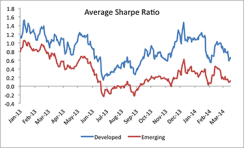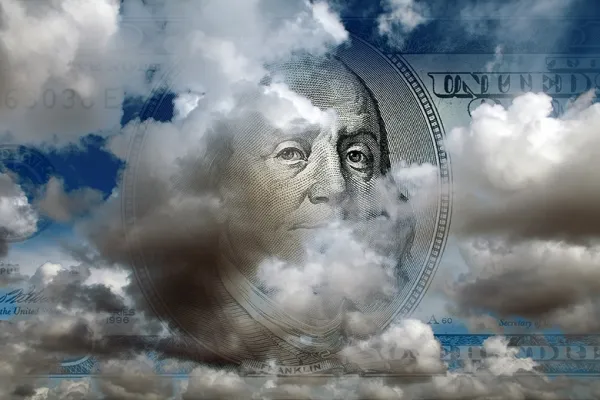In this era of instant financial and economic contagion, a butterfly’s wing flapping in Greece or Thailand can send reverberations through stock exchanges in New York and London. Yet world markets have shrugged off a disturbance of potentially historic proportions during the past few weeks: Russia’s annexation of the Ukrainian province of Crimea and the resulting revival of cold war–style tensions between Moscow and the West. “Except for the Russian and Ukrainian markets themselves, this is basically a nonevent,” says Melissa Brown, senior director of applied research at New York–based risk analytics and financial data firm Axioma, which studies equity and currency volatility around the world.
The outlook for global emerging markets in fact improved as the Ukraine crisis gathered momentum over the past month. The price of the widely traded IShares MSCI Emerging Markets Exchange-Traded Fund (EEM), after a 8.63 percent drop in January, has reclaimed some of its losses since the start of the year, closing on March 18 at –5.71 percent since the start of the year — with a sharp gain during the previous five days — and volatility declining considerably. That brought global emerging markets’ Sharpe ratio, a measure of reward versus risk, back into positive territory after touching zero in early February, according to Axioma’s data. The spread between the Sharpe ratios of developed and emerging markets halved during February, to about 0.5, its lowest figure since early 2013 (see chart). “We’re observing an extremely low level of risk right now in emerging markets,” Brown says. “Not an all-time low, but low.”

Note: lines represent the unweighted average Sharpe ratio of countries in each classification.
Source: Axioma
The nonreaction to events in the former Soviet Union should be no surprise, says John-Paul Smith, global emerging-markets equity strategist with Deutsche Bank in London. Ukraine joins a long list of political disturbances that grabbed headlines but affected only their local markets, which includes, among other events, the 2011 Arab Spring revolutions in Egypt and Tunisia, Thai Prime Minister Thaksin Shinawatra’s removal by military coup in 2006 and Ukraine’s own Orange Revolution in 2004.
Despite the perception that investors will react to anything, a national crisis needs to threaten some potent financial nexus to affect world markets. The mother of all contagion events since the collapse of Lehman Brothers Holdings in September 2008 occurred in August 2011, when in light of a standoff in the U.S. Congress about raising the national debt ceiling, Standard & Poor’s downgraded U.S. Treasury bonds from a 70-year triple-A credit rating to AA+ with a negative outlook. “That doubled emerging-markets volatility almost overnight,” Brown remarks.
Smith remains negative on global emerging markets, a stance he has held for the past three years, though not because of the conflict in Ukraine. Instead he is watching China, which on March 13 unveiled a range of weak economic data for the first two months of this year, showing decelerating growth in key indicators, such as industrial production and retail sales, and a 27 percent year-on-year crash in construction starts. “China has four times the weight of Russia in the global MSCI emerging-markets index,” Smith says.
If any markets are to see any major movement in connection with the face-off over Ukraine, it may be in developed Europe, particularly Germany, which is by far Russia’s largest bilateral trading partner. The Deutsche Börse index has fallen by more than 4 percent during the past month. As a point of comparison, the U.S. Standard & Poor’s 500 index advanced by 1 percent. Smith sees a complex of factors behind this underperformance, including potential drops in demand for German exports from China and the Middle East, where economies are cooling as oil prices dip. But if and when international sanctions begin to bite on the Russian economy, some contagion to Germany will be inevitable.






